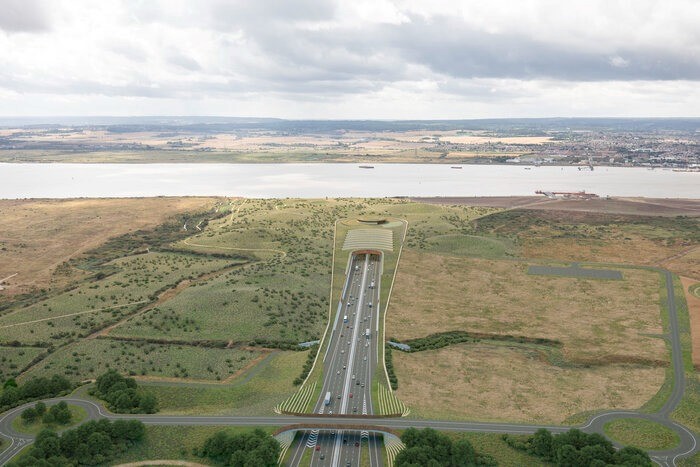The Labour government has given its clearest indication yet that it is backing the £9bn Lower Thames Crossing (LTC).
In a major speech on Wednesday, the chancellor revealed that she was exploring private finance options for the scheme but gave no detail on what form this might take.
The Planning Inspectorate has already provided its recommendation on the project's Development Consent Order (DCO) and the Government currently has until May this year to make a decision.
Ms Reeves said: 'We will work with the private sector to deliver the infrastructure that our country desperately needs.
'This includes the Lower Thames Crossing which will improve connectivity at Dover, Felixstowe at Harwich, alleviating severe congestion as goods destined for export come from the North, the Midlands and across the UK, to markets overseas.
'To drive growth and to deliver value for money for taxpayers, we are exploring options to privately finance this important project.'
While the use of private finance for the mega-project might remove one headache from Ms Reeves' review of capital spending in the run-up to the Spending Review, it could still present difficulties to approval of the scheme.
National Highways submitted a funding statement as part of the LTC application, which said that the LTC would be 'funded through government funding of National Highways'.
It noted that LTC was included in the 2015-2020 Road Investment Strategy (RIS) and that the funding commitment from the Department for Transport (DfT) had been continued in the current RIS.
It concluded: 'The Government and National Highways commitments described above demonstrate that the Project will be fully funded by the Department for Transport through the Statement of Funds Available (SoFA). Consequently, the Project is not dependent on funding contributions from other parties or sources, including road user charging.'
After previous press reports suggesting that ministers could use private finance to pay for the LTC, solicitors Leigh Day, acting on behalf of the Transport Action Network – campaigners opposed to the scheme – wrote to the DfT arguing that this would invalidate the current planning process.
The letter stated that without public funding there would no longer be certainty money would be available within the statutory period for the compulsory purchase of land affected by the scheme; and, if future road user charging revenues were used to attract investors, that could 'fundamentally change the modelling of the benefits and impacts of the scheme'.
Additionally, they argued that using private finance to build the LTC 'would also require higher interest rates than Treasury borrowing, resulting in the scheme costing more to deliver, beyond the £9bn outlined in the Funding Statement'.
It concluded: The transport secretary 'cannot lawfully grant development consent unless the funding position for the scheme is resolved and the government decides that it will commit to full public funding for the scheme, and the modelling assumptions and environmental impacts used in the DCO application and the examination remain intact'.
However, other legal professionals Highways spoke to contested the Leigh Day's analysis.
Chris May, planning partner at law firm Freeths, said it was ‘not so black and white'.
‘There is a general principle that if the decision maker says they have had regard to a material change [in the appraisal] that is sufficient and the court is reluctant to overrule the judgement,' he told Highways.
National Highways has resubmitted the DCO application once before however this was before the Planning Inspectorate made its recommendation.
Lord Hutton, chair of the Association of Infrastructure Investors in Public Private Partnerships, said: 'It's impossible to plug the maintenance hole or build new infrastructure without bringing in the private sector.
'Every other western country uses a similar approach to public private partnerships , which the UK pioneered, but then cancelled in 2018. We're now a low investment nation: since 2000 investment has averaged 2.5% of GDP, less than two-thirds of the OECD average. If we are to go for growth, we need a new vision for private investment in our social infrastructure.'
Marie-Claude Hemming, director of operations for the Civil Engineering Contractors Association,
said: 'We welcome the fact that the UK Government has committed to unleashing the full potential of the UK economy through public and private investment in infrastructure.
'Industry is keenly awaiting the publication of this Spring's Planning and Infrastructure Bill, but the chancellor's commitment to speeding up planning and removing blockers to growth, such as excessive use of judicial review, are positive signs that the UK Government has listened to industry, and will act accordingly.'
The LTC would connect Kent, Thurrock and Essex. Approximately 14.5 miles (23km) in length, it will connect to the existing road network from the A2/M2 to the M25 with two tunnels (one southbound and one northbound) running beneath the River Thames.
































